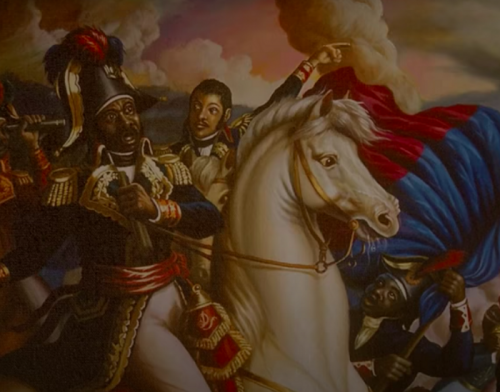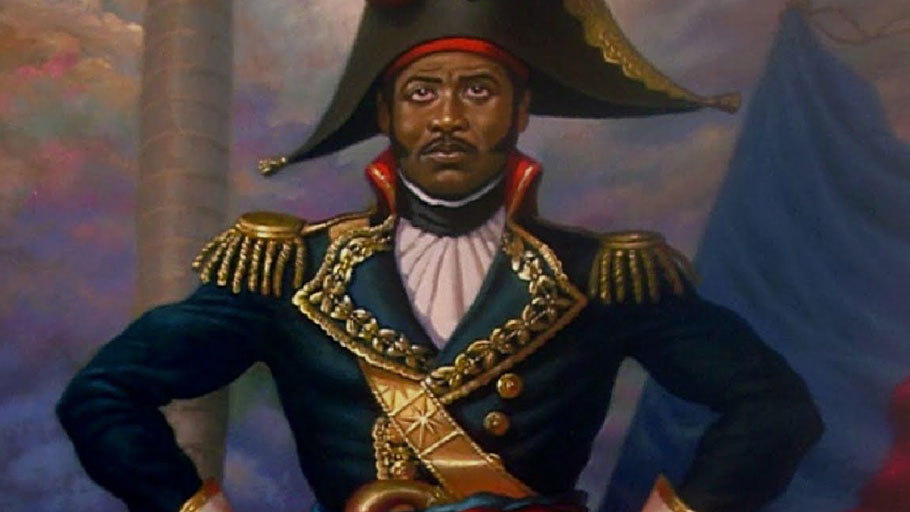
The Haitian Declaration of Independence, January 1, 1804, The National Archives of the UK, CO 137/111/1.
Today is Haitian Independence Day, the anniversary of the revolution that defeated French colonialism. On January 1, 1804, Haiti became the second independent country in the Americas and the world’s first nation to permanently abolish slavery.
But today is also a time to remember Jean-Jacques Dessalines, a military leader, politician, and a long-neglected hero of the Revolution who actually declared Haitian independence. Born enslaved in Saint-Domingue (Haiti’s colonial name), he joined the revolution in 1791 and eventually became the country’s first head-of-state.

Screengrab from the Beats by Dre film “You Love Me.” The original painting is “Battle of Vertières II, 1803,” by Haitian artist Ulrick Jean-Pierre, 1995.
This past year, Dessalines showed up in the Beats by Dre ad “You Love Me” — atop a white horse, his navy uniform gleaming with gold trim, he valiantly leads Haitian troops to battle against Napoleon’s occupying army. He’s also in Steve McQueen’s 2020 film “Mangrove,” the story of Black West Indian immigrants protesting police violence in London in 1970. In the film, we see a stoic Dessalines, sword in hand, alongside the Haitian flag.
In both instances, Dessalines embodies radical Black self-determination and the condemnation of anti-Black violence. In Haitian pop culture, Dessalines is alleged to have said the phrase “Koupe tet, boule kay” — which in Haitian Kreyòl means “cut off their heads, burn down their houses” — meant to represent his no-holds-barred, scorched earth tactics.
Why are we in a Dessalinian moment?
The figure most widely associated with the revolution has been Toussaint Louverture, the revolutionary general who won control of the colony but stopped short of declaring complete independence from France. Instead, as governor, Louverture encouraged the return of the ruling class of white plantation owners, and historians portray him as pragmatic and rational, a figure much more palatable to the French — and to US enslavers aghast at accounts of enslaved Black people rising against the white French colonizers.
Dessalines succeeded Louverture as the primary leader of the revolution and defeated French forces to free Haiti once and for all. Dessalines’s commitment to destroying slavery, racism, and colonialism was uncompromising, but the violence attributed to him was exaggerated and some of it entirely fictionalized. Because Dessalines represented a more bold and unapologetic demand for full Black liberation, foreigners wanted to undercut his success by describing him as “uncivilized.” Dessalines has been wrongfully accused of “massacring” thousands of white people on the island after he declared independence.
“My name has become a horror to all those who want slavery,” he claimed in the January 1, 1804 Declaration of Independence. “Despots and tyrants never utter it unless to curse the day that I was born.”
The fallout from Dessalines’s bold Declaration of Independence was devastating for Haiti. The United States and European allies punished Haitians mercilessly by withholding diplomatic recognition and undermining state sovereignty. But slavery never returned to Haiti.
Today, Dessalines’s official state motto, “Liberté ou la Mort,” (Liberty/Freedom or Death) is a cry for our times. The motto can be read as a battle cry, “we will die for freedom,” or as a comment on the effects of racist police violence, “without freedom, we will die.”
After a year of ongoing protests in which hundreds of thousands of Americans joined in support of the Black Lives Matter movement, marching in memory of George Floyd, Breonna Taylor, and the countless other Black men, women, and children who have died from police violence, it’s time for Americans to seriously reconsider the Haitian Revolution and its leaders.
No wonder Dessalines’s radical message has found a place in contemporary culture. As monuments to Confederate generals and upholders of slavery are toppling in the US and around the world, we have the opportunity to replace them with new icons that embody our values today. I nominate Dessalines.
Just as the Caribbean nation of Haiti remains a potent symbol of Black resistance to this day, let us never forget how the memory of this intrepid leader continues to inspire the global struggle for equality and self-determination.
Source: MEDIUM















